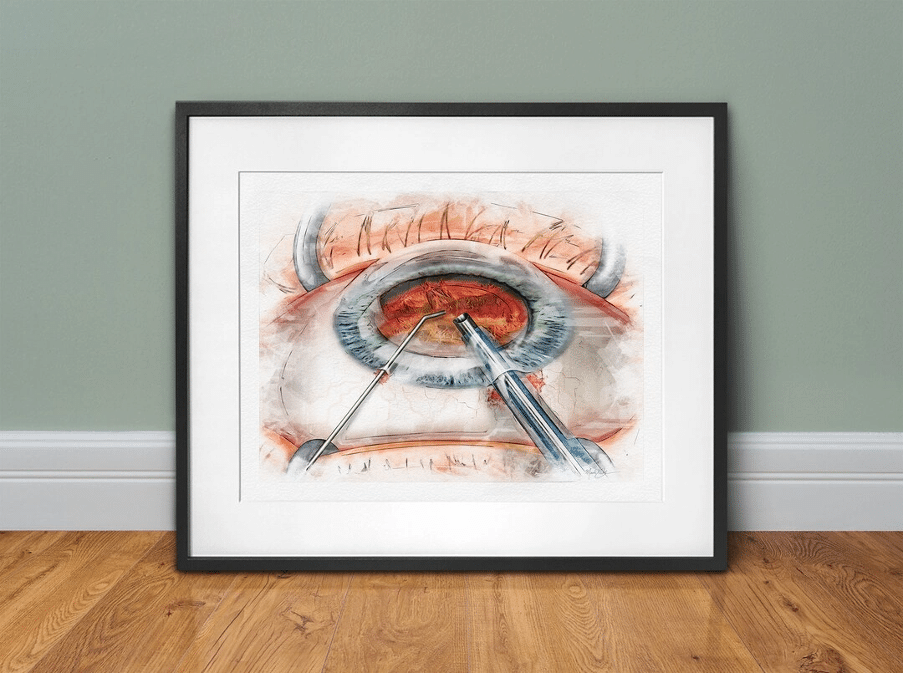Cataract surgery improves life quality for over 95% of patients who get the procedure. Our vision often gets cloudy as we age. Cataracts show up with blurred eyesight, light sensitivity, and make daily tasks much harder. A simple 15 to 20-minute procedure can change everything.
Patients often say their new vision feels like “seeing the world in HD.” Colours look brighter and everything becomes crystal clear. The success rates of cataract surgery in the UK are impressive. A newer study, published in 2023 by researchers shows more than 98% of procedures finished without major complications. The research also points to some surprising benefits. People who get their cataracts removed have a 30% lower chance of developing dementia compared to those who don’t. London residents who need cataract surgery should take note of these numbers. They are a great way to get the confidence to fix vision problems right away instead of waiting.
This piece will walk you through how cataracts affect your daily routine. You’ll learn what happens during the surgery and see the amazing changes patients experience afterward. From fewer falls to renewed confidence behind the wheel and at social gatherings, the benefits are clear.

What cataracts do to your daily life
Cataracts change your clear vision into a daily struggle with obstacles. Your eye’s lens clouds over time, making everything around you look blurry, hazy, and less vibrant.
Blurry vision and light sensitivity
You might not notice anything wrong when cataracts first appear. Your vision becomes cloudy as they grow worse – similar to looking through a foggy window. You might experience:
- Cloudy or blurry vision
- Faded or yellowing colours
- Halos around lights
- More sensitivity to glare
- Double vision in one eye
- Your glasses prescription changes often
Your symptoms depend on the type of cataract. Nuclear cataracts, the most common age-related type, affect your central lens and make it hard to see at night. Your lens edges get affected by cortical cataracts, which create problems with glare, especially around bright lights after dark.
Struggles with reading and driving
Simple tasks become harder as cataracts develop. Reading turns frustrating, and posterior subcapsular cataracts make it especially hard to read and see clearly during the day. You might miss recipe ingredients or vacuum up small objects because cooking and cleaning take longer.
Driving becomes a serious concern. People who have cataracts are four times more likely to have trouble in challenging driving situations. Night driving turns dangerous because headlights and streetlights create more glare. Many people lose their independence and either cut back on driving or stop completely.
Emotional and social impact
Cataracts don’t just limit your physical activities – they take an emotional toll too. Research shows that about 83% of people struggle with daily tasks as their cataract vision worsens, and 26% feel anxious because of these limitations.
Depression and cataracts go hand in hand. A 16-year old study shows that people with cataracts were 78% more likely to experience depression. Older adults who had cataracts were 33% more likely to feel depressed than those without.
Struggling with Cloudy Vision? Expert cataract surgery in London can help you see clearer and brighter. Book Your Consultation Today
Money plays a big role in cataract outcomes. People who needed but couldn’t afford medical care reported more vision loss from cataracts. We have a long way to go, but we can build on this progress – cataract surgery can substantially improve both your vision and mental health.
How cataract surgery restores your vision

Image Source: Etsy
Cataract surgery reshapes the scene by turning cloudy vision into crystal clear sight through a quick and effective procedure. Let’s get into how this life-changing operation works and why patients see the world with fresh eyes.
What happens during the procedure
The surgery takes just 15-20 minutes as an outpatient procedure under local anaesthetic. The surgeon makes a tiny incision (approximately 2mm) in your cornea and uses ultrasound waves (phacoemulsification) to break up the cloudy lens. They remove it with gentle suction. A new artificial intraocular lens (IOL) fits exactly where your natural lens was. Your small incision heals naturally without stitches, which speeds up recovery.
Types of intraocular lenses (IOLs)
Your choice of IOL substantially affects your post-surgery vision quality. Several options exist:
- Monofocal lenses – Most common type that provides clear vision at one distance (usually far). You might need reading glasses to work up close.
- Multifocal lenses – These have multiple corrective zones that offer clear vision at various distances (near, intermediate, and far). They help reduce your need for glasses.
- Extended Depth of Focus (EDOF) lenses – These give you a continuous range of vision with fewer visual disturbances than multifocal lenses.
- Toric lenses – These correct astigmatism while providing clear vision at specific distances.
- Accommodative lenses – These match your eye’s natural focusing ability by changing position within the eye.
Cataract surgery success rate UK
The UK shows remarkable cataract surgery success rates. The National Ophthalmology Database audit shows less than 1 in 200 patients face substantial vision reduction after surgery. The major surgical complication (posterior capsule rupture) affects less than 1% of operations. This has led to more cataract procedures nationwide, with over 409,000 surgeries performed in England in 2022. The procedure achieves a 98% success rate without significant complications. This makes it one of the safest and most effective surgical procedures available today.
Also Read: Single vs Double Cataract Surgery: What London Specialists Recommend
Everyday improvements after surgery

Cataract surgery delivers amazing improvements that go way beyond the reach and influence of clear vision. Patients experience a better quality of life, and multiple studies confirm positive changes in their daily activities and overall well-being.
Seeing colours and details clearly again
Most patients notice dramatic changes in how they perceive colours after cataract surgery. Objects appear more vibrant as the yellowish tint from cataracts fades away. Some people might see a bluish tint at first—their beige couch could look lilac—but this usually returns to normal within three months. A patient shared this experience: “I can appreciate things I couldn’t appreciate before. Now that I can see well, I can appreciate the beauty of the world. It’s a life-changing thing”.
Regaining independence in daily tasks
About 90% of patients report substantially better vision after successful surgery. The results show that 87% of patients feel more independent with their clear eyesight. Simple tasks like reading fine print and cooking become easier without needing help. To cite an instance, many patients need their glasses less often, especially when looking at distant objects. This newfound independence helps people return to hobbies they had given up.
Reduced risk of falls and accidents
Cataract surgery makes a big difference in reducing accident risks. First-eye cataract surgery cuts fall rates by 31%, while second-eye surgery adds another 50% reduction. Research shows falls decrease from 37% before surgery to just 19% after. These improvements help elderly patients, people on multiple medications, and those with previous fall history.
Better emotional well-being
Clear vision brings remarkable emotional benefits. Post-surgery surveys reveal that 74% of patients feel happier, 76% more satisfied, and 68% have greater appreciation for their lives. Research consistently proves that successful cataract surgery helps reduce anxiety and depression symptoms. Of course, these mental health improvements connect directly to better visual clarity, contrast sensitivity, and stereopsis.
What to expect before and after surgery
A proper preparation for cataract surgery helps you achieve better vision and smooth recovery. Several key stages will get you ready for this life-changing procedure.
Preparing for cataract surgery in London
Your pre-operative assessment will involve specialists measuring your eye to determine the right replacement lens power. This appointment has detailed biometry to select the ideal intraocular lens. Your medical conditions need good control – your surgery might need rescheduling if your blood pressure reads above 160/100 or blood sugar levels exceed 10mM.
Most London clinics suggest you continue taking your regular medications unless told otherwise. You should stop wearing contact lenses at least 24 hours before your appointment. Struggling with Cloudy Vision? Experience clearer, brighter vision with expert cataract surgery in London. Book Your Consultation Today.
Recovery timeline and care tips
Your eye might feel gritty and itchy right after surgery, with mild discomfort – this happens normally. Blurry vision and increased light sensitivity could last for 1-2 days. You’ll need to protect your eye with a shield at night and use prescribed antibiotic and anti-inflammatory eye drops for about 4 weeks. Most patients resume their normal activities except swimming within 7-10 days. You can finish your eye drops regimen and visit an optician for new glasses measurement between 3-4 weeks after surgery. You should be able to return to all normal sports and activities by 6 weeks.
Common concerns and how they’re addressed
Pain management remains simple – most people feel minimal discomfort that over-the-counter painkillers can handle. Your follow-up appointments address driving concerns – your optometrist can confirm if you’re fit to drive one week after surgery. Complications after cataract surgery rarely occur, with 98% of operations being complication-free. You should get immediate medical help if you notice severe pain, sudden vision loss, persistent redness, or light flashes. Posterior capsule opacification (PCO) might develop later and make vision cloudy again – a quick, painless laser procedure fixes this issue.
Conclusion
Transforming lives through clearer vision
Cataract surgery ranks among modern medicine’s greatest achievements and gives remarkable benefits beyond better eyesight. This piece shows how cataracts slowly reduce life’s quality by causing blurry vision, reading problems, and driving dangers. Vision problems often trigger emotional challenges like anxiety and depression. The surgery provides a proven solution with impressive results. A quick 15-20 minute procedure has a 98% success rate in the UK. Advanced techniques like phacoemulsification and carefully chosen intraocular lenses turn cloudy vision into clarity.
People’s lives change substantially after cataract surgery. Colours become vibrant, daily tasks become easier, and independence returns. The surgery also reduces fall risks – a vital benefit if you have advanced age. Research shows improved emotional health, with three-quarters of patients feeling happier and more satisfied with life after surgery. Good preparation helps create successful outcomes. A pre-operative assessment will give a proper lens choice. Following post-surgery care instructions helps optimal healing. Some discomfort might appear at first, but most patients resume normal activities within 7-10 days.
Getting cataracts fixed early rather than waiting gives great rewards. The change from cloudy to crystal clear vision lets patients enjoy life’s visual pleasures again. Reading favourite books, enjoying London’s vibrant scenery, or just doing daily tasks with confidence become possible. Cataract surgery ended up being more than just fixing vision – it helps people live life fully and clearly again.
FAQs
Q1. How long does cataract surgery take and is it painful? Cataract surgery typically takes only 15-20 minutes and is performed under local anaesthetic. Most patients experience little to no pain during the procedure, with only mild discomfort afterwards that can be easily managed with over-the-counter painkillers.
Q2. What are the success rates for cataract surgery in the UK? The success rates for cataract surgery in the UK are remarkably high. Approximately 98% of procedures are completed without significant complications, making it one of the safest and most effective surgical procedures available.
Q3. How soon after cataract surgery can I resume normal activities? Most patients can return to normal activities within 7-10 days after surgery, except for swimming. By 6 weeks post-surgery, you should be able to resume all normal sports and activities. However, you may be able to drive sooner, pending confirmation from your optometrist at a follow-up appointment.
Q4. Will I still need glasses after cataract surgery? The need for glasses after cataract surgery depends on the type of intraocular lens (IOL) implanted. While monofocal lenses may require reading glasses for close work, multifocal or accommodative lenses can reduce dependency on glasses for various distances. Your surgeon will discuss the best option for your specific needs.
Q5. How does cataract surgery impact quality of life? Cataract surgery significantly improves quality of life for most patients. Benefits include clearer vision, more vibrant colour perception, increased independence in daily tasks, reduced risk of falls, and improved emotional well-being. Many patients report feeling happier and more satisfied with life after the procedure.
Authors & Reviewer
-
 Olivia: Author
Olivia: AuthorHi, I'm Olivia, a passionate writer specialising in eye care, vision health, and the latest advancements in optometry. I strive to craft informative and engaging articles that help readers make informed decisions about their eye health. With a keen eye for detail and a commitment to delivering accurate, research-backed content, I aim to educate and inspire through every piece I write.
-
 Dr. CT Pillai: Reviewer
Dr. CT Pillai: ReviewerDr. CT Pillai is a globally recognised ophthalmologist with over 30 years of experience, specialising in refractive surgery and general ophthalmology. Renowned for performing over 50,000 successful laser procedures.

